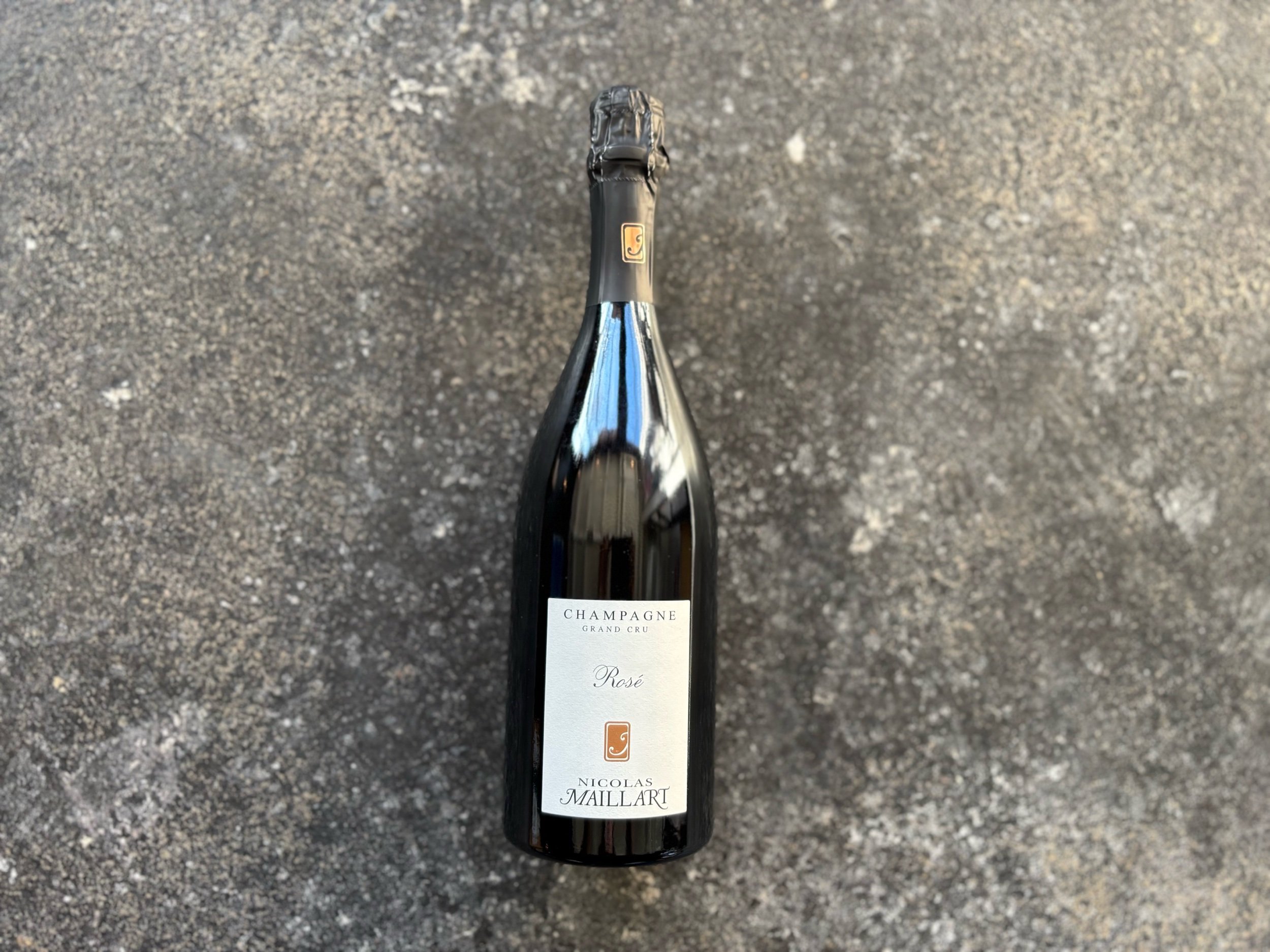 Image 1 of
Image 1 of


Champagne Nicolas Maillart Grand Cru Rosé Extra NV
Location: France, Champagne, Montagne de Reims
Winemaker: Nicolas Maillart
Grapes: 60% Pinot Noir, 40% Chardonnay
Soil: Clay, limestone
Winemaking: Organic farming. Hand harvested. Fermented in oak barrels. Vinified and aged for 10 months in 228L barrel or 3000L foudre.
Disgorged: March 2024
From the Importer Kermit Lynch: Nicolas Maillart owns and farms vineyards in Écueil, Villers-Allerand, and Bouzy, all just south of Reims. These are among the world’s greatest terroirs for growing Champagne grapes, and they have been brilliantly matched chez Maillart to Chardonnay, Pinot Meunier, Pinot Noir, and Petit Meslier in order to extract the best qualities of each grape for both his blended multi-vintage Champagnes and his single-vineyard-vintage bottlings. All of his Champagnes are fermented and aged in wood, minimally sulfured, and bottled unfiltered with very little dosage.
Nicolas has made wine at his family estate in the village of Écueil since 2003. He controls, farms, and manages all of his vineyards himself, working all of his soils. His Champagnes are pure, elegant, terroir-transparent, stylish, and delicious! Tasting through his lineup of vins clairs is like tasting through a cellar of young wines in Burgundy, and he has figured out how to transform the magic he has in barrel into his resulting Champagnes that emerge years later.
Location: France, Champagne, Montagne de Reims
Winemaker: Nicolas Maillart
Grapes: 60% Pinot Noir, 40% Chardonnay
Soil: Clay, limestone
Winemaking: Organic farming. Hand harvested. Fermented in oak barrels. Vinified and aged for 10 months in 228L barrel or 3000L foudre.
Disgorged: March 2024
From the Importer Kermit Lynch: Nicolas Maillart owns and farms vineyards in Écueil, Villers-Allerand, and Bouzy, all just south of Reims. These are among the world’s greatest terroirs for growing Champagne grapes, and they have been brilliantly matched chez Maillart to Chardonnay, Pinot Meunier, Pinot Noir, and Petit Meslier in order to extract the best qualities of each grape for both his blended multi-vintage Champagnes and his single-vineyard-vintage bottlings. All of his Champagnes are fermented and aged in wood, minimally sulfured, and bottled unfiltered with very little dosage.
Nicolas has made wine at his family estate in the village of Écueil since 2003. He controls, farms, and manages all of his vineyards himself, working all of his soils. His Champagnes are pure, elegant, terroir-transparent, stylish, and delicious! Tasting through his lineup of vins clairs is like tasting through a cellar of young wines in Burgundy, and he has figured out how to transform the magic he has in barrel into his resulting Champagnes that emerge years later.
Location: France, Champagne, Montagne de Reims
Winemaker: Nicolas Maillart
Grapes: 60% Pinot Noir, 40% Chardonnay
Soil: Clay, limestone
Winemaking: Organic farming. Hand harvested. Fermented in oak barrels. Vinified and aged for 10 months in 228L barrel or 3000L foudre.
Disgorged: March 2024
From the Importer Kermit Lynch: Nicolas Maillart owns and farms vineyards in Écueil, Villers-Allerand, and Bouzy, all just south of Reims. These are among the world’s greatest terroirs for growing Champagne grapes, and they have been brilliantly matched chez Maillart to Chardonnay, Pinot Meunier, Pinot Noir, and Petit Meslier in order to extract the best qualities of each grape for both his blended multi-vintage Champagnes and his single-vineyard-vintage bottlings. All of his Champagnes are fermented and aged in wood, minimally sulfured, and bottled unfiltered with very little dosage.
Nicolas has made wine at his family estate in the village of Écueil since 2003. He controls, farms, and manages all of his vineyards himself, working all of his soils. His Champagnes are pure, elegant, terroir-transparent, stylish, and delicious! Tasting through his lineup of vins clairs is like tasting through a cellar of young wines in Burgundy, and he has figured out how to transform the magic he has in barrel into his resulting Champagnes that emerge years later.
